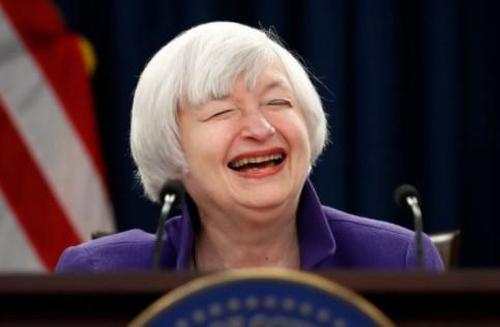In comments made on Monday morning, Fed Chair Treasury Secretary Janet Yellen set the stage for several exciting new initiatives, including a higher corporate tax, potentially higher capital gains taxes, yield curve control... oh and a digital dollar.
Yellen came out in favor of boosting corporate taxes and said she was also open to raising capital gains taxes, during a Monday conference hosted by the New York Times. Yellen said that the Biden administration could boost the corporate tax rate to 28% to help pay for "Biden's planned longer-term economic reconstruction program". Such a hike in corporate taxes could immediately trigger profit taking in financial assets that have benefited from a low corporate tax rate (the one that, according to CNBC, was being "priced in" at least once a day for several entire years during the Trump administration).
Despite this, she claimed that the Biden administration has not yet favored a wealth tax, news that will likely trigger AOC, Ilhan Omar, Elizabeth Warren and the like. "A wealth tax has been discussed but is not something President Biden," Yellen said on Monday.

She also said a higher capital gains tax was "worth considering". "One would have to examine closely what effect it would have," she noted, referring to such a tax's effect on "ordinary investors".
As Bloomberg notes, one of the big challenges for the market will be any changes in tax policy toward a less-friendly regime. As we discussed late on Sunday, a Tobin tax (i.e., a HFT transaction tax) has been mentioned by the White House, although it will quickly die a quiet death as it would lead to market wide crash as the HFT "liquidity" money makers revolt. Incidentally, a hike to the capital gains tax could also lead to profit-taking on a whole host of assets if there's a window to lock in the lower rate.
Yellen also talked about the idea of looking at new ultra-long duration debt such as a 100 year bond in order to "take advantage" of low yields (her predecessor Steven Mnuchin did the same on several occasions before killing the idea), which Yellen doesn't seem to realize are low because the Fed has set them this low. Regardless, Yellen said she thinks a market for a 100 year bond would be "very tiny" and "very thin".
Perhaps most notable was Yellen's reaffirmation that it "makes sense" for the Fed to look into the idea of a digital dollar - comments that potentially played a role in bitcoin's early morning selloff which briefly saw the cryptocurrency crash 15% and fall under $50,000. The price has since risen back above $50,000 despite additional comments from Yellen that bitcoin was "inefficient".
In a tangent, Yellen said that she hadn't anticipated an offer by Biden to become Treasury secretary, at a time when she was focusing on giving out $250,000 speeches to Citadel research while working at the Brookings Institution. Noting the round-the-clock stress of a job like helming the Treasury, the former Federal Reserve chair said, "I was initially hestitant to get back into that." Biden then made the case on how she could be helpful, Yellen said.
Finally, in confirming that yield curve control is coming one way or another, the only question is whether before or after 2.0% on the 10%...
What comes first— z.h. (@z.h.) February 22, 2021
... Yellen offered up the amusing notion that debt interest payments are a better metric than debt to GDP. We wonder if this is because one metric is absolutely terrifying...

...while the other is directly controlled by the Fed and is currently at artificially all time lows.
Commenti
Posta un commento